Analysis of Transformational Theory in Healthcare Leadership
VerifiedAdded on 2022/09/05
|17
|1783
|17
Presentation
AI Summary
This presentation delves into the application of transformational leadership theory within the healthcare industry. It begins by defining transformational leadership and its core elements, such as idealized influence, inspirational motivation, intellectual stimulation, and individualized consideration, emphasizing its role in driving organizational change and inspiring employees. The presentation analyzes the changing nature of leadership in healthcare management, highlighting the impact of technological advancements and evolving employee roles. It examines the effects of transformational leadership on healthcare services, focusing on improved patient satisfaction, quality of care, and employee well-being, while also addressing the challenges of stress and burnout. The presentation then showcases two case studies demonstrating the practical application of transformational leadership, including examples from the UCLA Center for Healthier Children, Families and Communities and the American Hospital Association. Finally, it references key research that supports the concepts discussed. The presentation aims to provide a comprehensive understanding of transformational leadership and its benefits in the healthcare sector.

Transformational Theory in Healthcare Industry
How transformational leadership impacts the Healthcare Service Industry
How transformational leadership impacts the Healthcare Service Industry
Paraphrase This Document
Need a fresh take? Get an instant paraphrase of this document with our AI Paraphraser
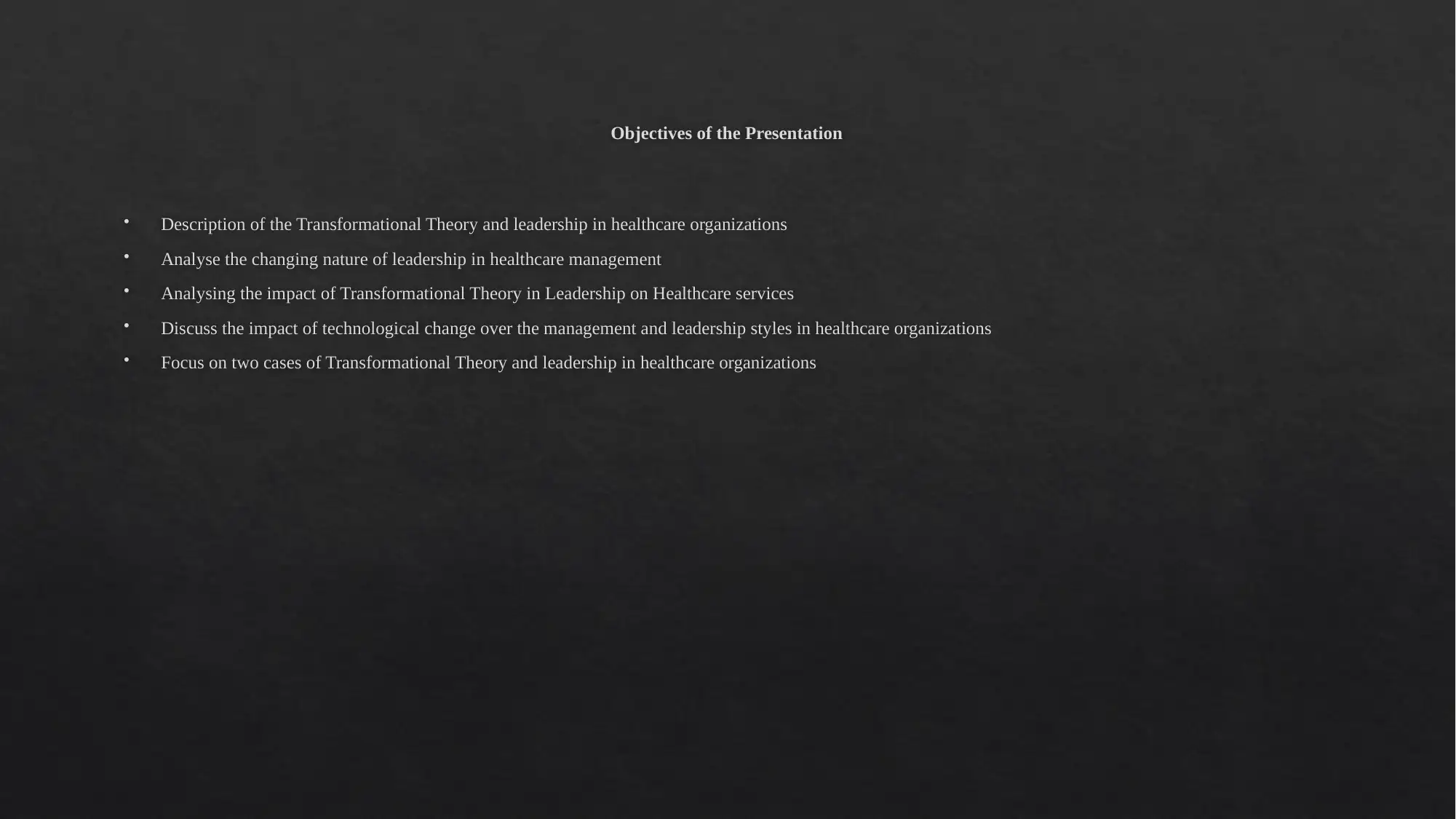
Objectives of the Presentation
Description of the Transformational Theory and leadership in healthcare organizations
Analyse the changing nature of leadership in healthcare management
Analysing the impact of Transformational Theory in Leadership on Healthcare services
Discuss the impact of technological change over the management and leadership styles in healthcare organizations
Focus on two cases of Transformational Theory and leadership in healthcare organizations
Description of the Transformational Theory and leadership in healthcare organizations
Analyse the changing nature of leadership in healthcare management
Analysing the impact of Transformational Theory in Leadership on Healthcare services
Discuss the impact of technological change over the management and leadership styles in healthcare organizations
Focus on two cases of Transformational Theory and leadership in healthcare organizations
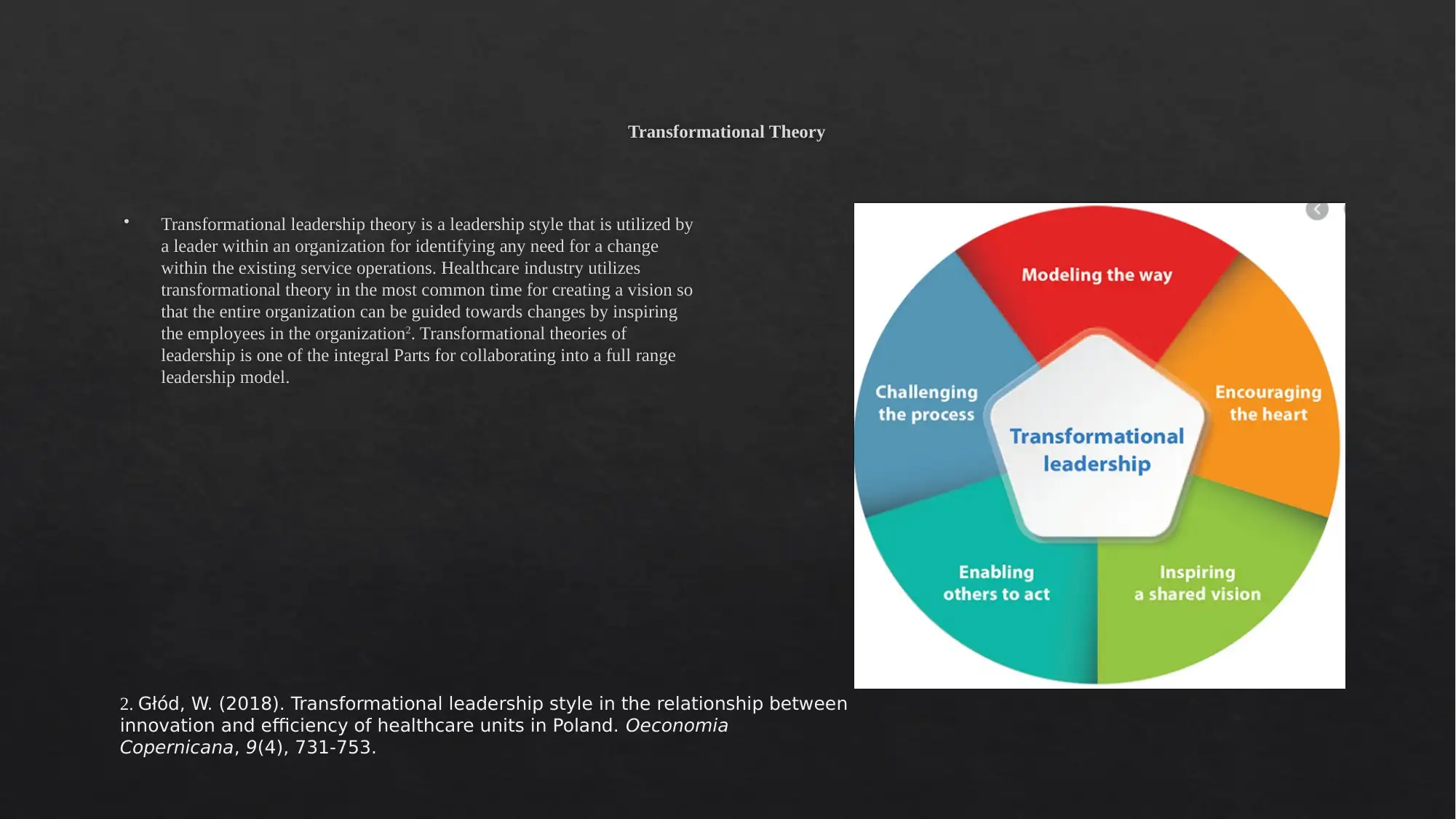
Transformational Theory
Transformational leadership theory is a leadership style that is utilized by
a leader within an organization for identifying any need for a change
within the existing service operations. Healthcare industry utilizes
transformational theory in the most common time for creating a vision so
that the entire organization can be guided towards changes by inspiring
the employees in the organization2. Transformational theories of
leadership is one of the integral Parts for collaborating into a full range
leadership model.
2. Głód, W. (2018). Transformational leadership style in the relationship between
innovation and efficiency of healthcare units in Poland. Oeconomia
Copernicana, 9(4), 731-753.
Transformational leadership theory is a leadership style that is utilized by
a leader within an organization for identifying any need for a change
within the existing service operations. Healthcare industry utilizes
transformational theory in the most common time for creating a vision so
that the entire organization can be guided towards changes by inspiring
the employees in the organization2. Transformational theories of
leadership is one of the integral Parts for collaborating into a full range
leadership model.
2. Głód, W. (2018). Transformational leadership style in the relationship between
innovation and efficiency of healthcare units in Poland. Oeconomia
Copernicana, 9(4), 731-753.
⊘ This is a preview!⊘
Do you want full access?
Subscribe today to unlock all pages.

Trusted by 1+ million students worldwide

Introduction need of leadership in healthcare services
A good leadership skill in healthcare, a leader within an
organisation mostly look forward to implement
motivational factor within the other employees of the
organisation so that the alignment of their mission and
vision would be possible for the other employees in the
organisation as well.
The leader has to inspire the team or set of employees
Inspiration and motivation is developed forming the four
elements of transformational theory
1. Allen, G. P., Moore, W. M., Moser, L. R., Neill, K. K., Sambamoorthi, U., & Bell, H. S.
(2016). The role of servant leadership and transformational leadership in academic
pharmacy. American journal of pharmaceutical education, 80(7).
A good leadership skill in healthcare, a leader within an
organisation mostly look forward to implement
motivational factor within the other employees of the
organisation so that the alignment of their mission and
vision would be possible for the other employees in the
organisation as well.
The leader has to inspire the team or set of employees
Inspiration and motivation is developed forming the four
elements of transformational theory
1. Allen, G. P., Moore, W. M., Moser, L. R., Neill, K. K., Sambamoorthi, U., & Bell, H. S.
(2016). The role of servant leadership and transformational leadership in academic
pharmacy. American journal of pharmaceutical education, 80(7).
Paraphrase This Document
Need a fresh take? Get an instant paraphrase of this document with our AI Paraphraser
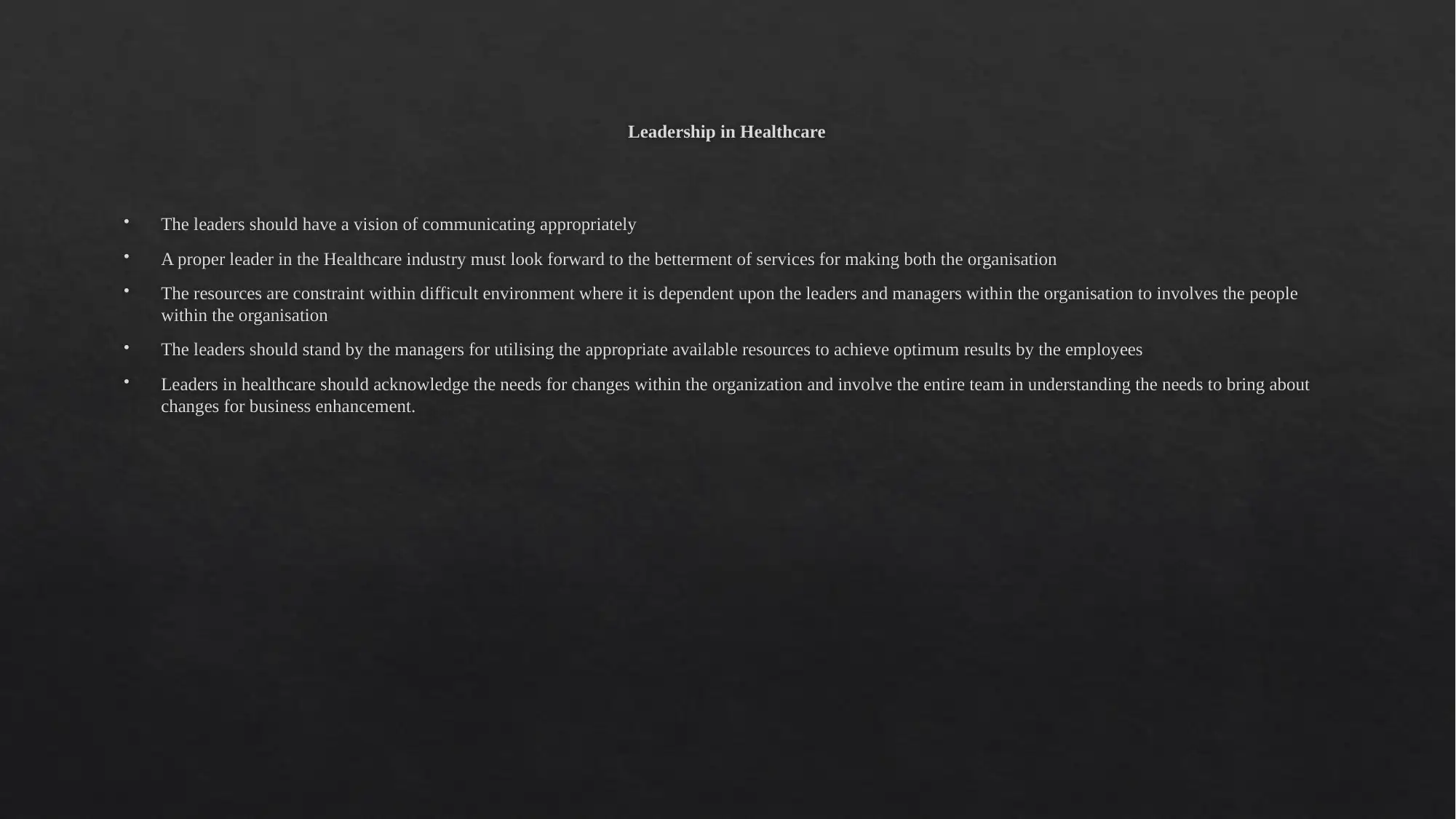
Leadership in Healthcare
The leaders should have a vision of communicating appropriately
A proper leader in the Healthcare industry must look forward to the betterment of services for making both the organisation
The resources are constraint within difficult environment where it is dependent upon the leaders and managers within the organisation to involves the people
within the organisation
The leaders should stand by the managers for utilising the appropriate available resources to achieve optimum results by the employees
Leaders in healthcare should acknowledge the needs for changes within the organization and involve the entire team in understanding the needs to bring about
changes for business enhancement.
The leaders should have a vision of communicating appropriately
A proper leader in the Healthcare industry must look forward to the betterment of services for making both the organisation
The resources are constraint within difficult environment where it is dependent upon the leaders and managers within the organisation to involves the people
within the organisation
The leaders should stand by the managers for utilising the appropriate available resources to achieve optimum results by the employees
Leaders in healthcare should acknowledge the needs for changes within the organization and involve the entire team in understanding the needs to bring about
changes for business enhancement.
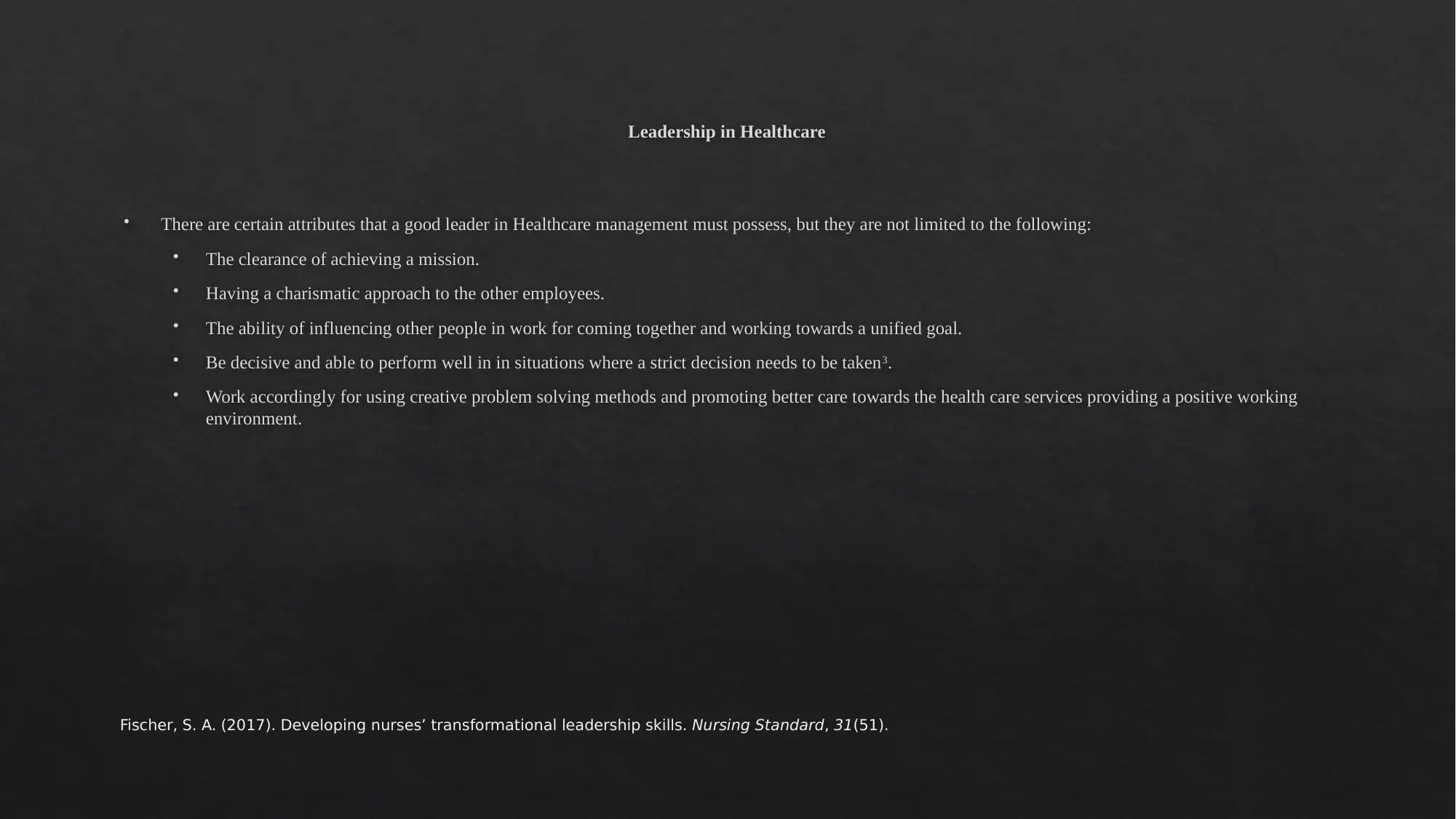
Leadership in Healthcare
There are certain attributes that a good leader in Healthcare management must possess, but they are not limited to the following:
The clearance of achieving a mission.
Having a charismatic approach to the other employees.
The ability of influencing other people in work for coming together and working towards a unified goal.
Be decisive and able to perform well in in situations where a strict decision needs to be taken3.
Work accordingly for using creative problem solving methods and promoting better care towards the health care services providing a positive working
environment.
Fischer, S. A. (2017). Developing nurses’ transformational leadership skills. Nursing Standard, 31(51).
There are certain attributes that a good leader in Healthcare management must possess, but they are not limited to the following:
The clearance of achieving a mission.
Having a charismatic approach to the other employees.
The ability of influencing other people in work for coming together and working towards a unified goal.
Be decisive and able to perform well in in situations where a strict decision needs to be taken3.
Work accordingly for using creative problem solving methods and promoting better care towards the health care services providing a positive working
environment.
Fischer, S. A. (2017). Developing nurses’ transformational leadership skills. Nursing Standard, 31(51).
⊘ This is a preview!⊘
Do you want full access?
Subscribe today to unlock all pages.

Trusted by 1+ million students worldwide
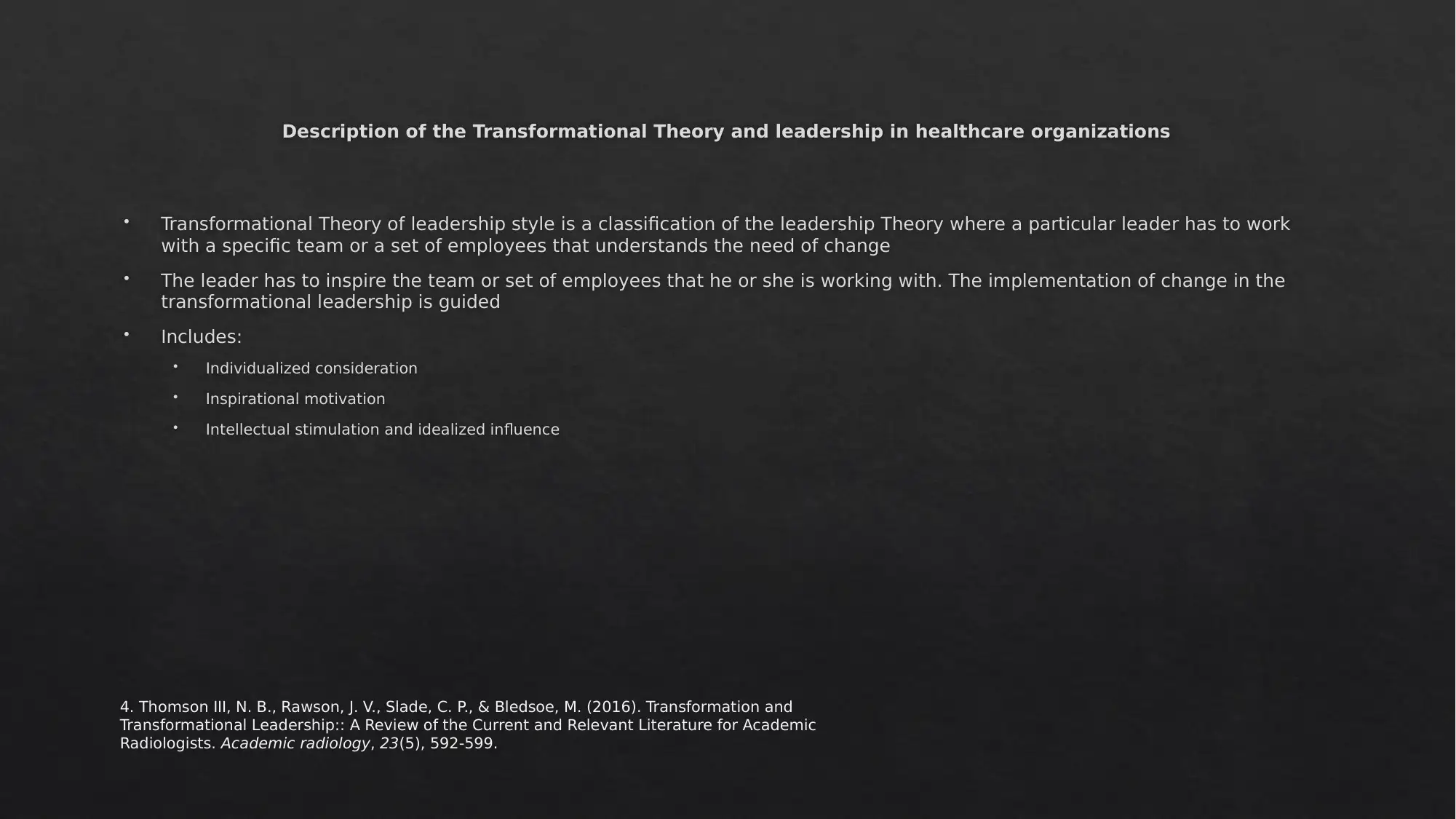
Description of the Transformational Theory and leadership in healthcare organizations
Transformational Theory of leadership style is a classification of the leadership Theory where a particular leader has to work
with a specific team or a set of employees that understands the need of change
The leader has to inspire the team or set of employees that he or she is working with. The implementation of change in the
transformational leadership is guided
Includes:
Individualized consideration
Inspirational motivation
Intellectual stimulation and idealized influence
4. Thomson III, N. B., Rawson, J. V., Slade, C. P., & Bledsoe, M. (2016). Transformation and
Transformational Leadership:: A Review of the Current and Relevant Literature for Academic
Radiologists. Academic radiology, 23(5), 592-599.
Transformational Theory of leadership style is a classification of the leadership Theory where a particular leader has to work
with a specific team or a set of employees that understands the need of change
The leader has to inspire the team or set of employees that he or she is working with. The implementation of change in the
transformational leadership is guided
Includes:
Individualized consideration
Inspirational motivation
Intellectual stimulation and idealized influence
4. Thomson III, N. B., Rawson, J. V., Slade, C. P., & Bledsoe, M. (2016). Transformation and
Transformational Leadership:: A Review of the Current and Relevant Literature for Academic
Radiologists. Academic radiology, 23(5), 592-599.
Paraphrase This Document
Need a fresh take? Get an instant paraphrase of this document with our AI Paraphraser

Description of the Transformational Theory and leadership in healthcare organizations
Individualized consideration: Individualized consideration is the ability of a leader to attend to the needs of the project team or the
service team that he or she is working with and has the ability to gain and overpowering charisma over the other team
members such that they considered the leaders as their mentor whom they should follow
Inspirational motivation: The inspirational motivation is a degree by which a leader has the opportunity to articulate the appealing
vision for inspiring and motivating the performer beyond their own expectations
Individualized consideration: Individualized consideration is the ability of a leader to attend to the needs of the project team or the
service team that he or she is working with and has the ability to gain and overpowering charisma over the other team
members such that they considered the leaders as their mentor whom they should follow
Inspirational motivation: The inspirational motivation is a degree by which a leader has the opportunity to articulate the appealing
vision for inspiring and motivating the performer beyond their own expectations
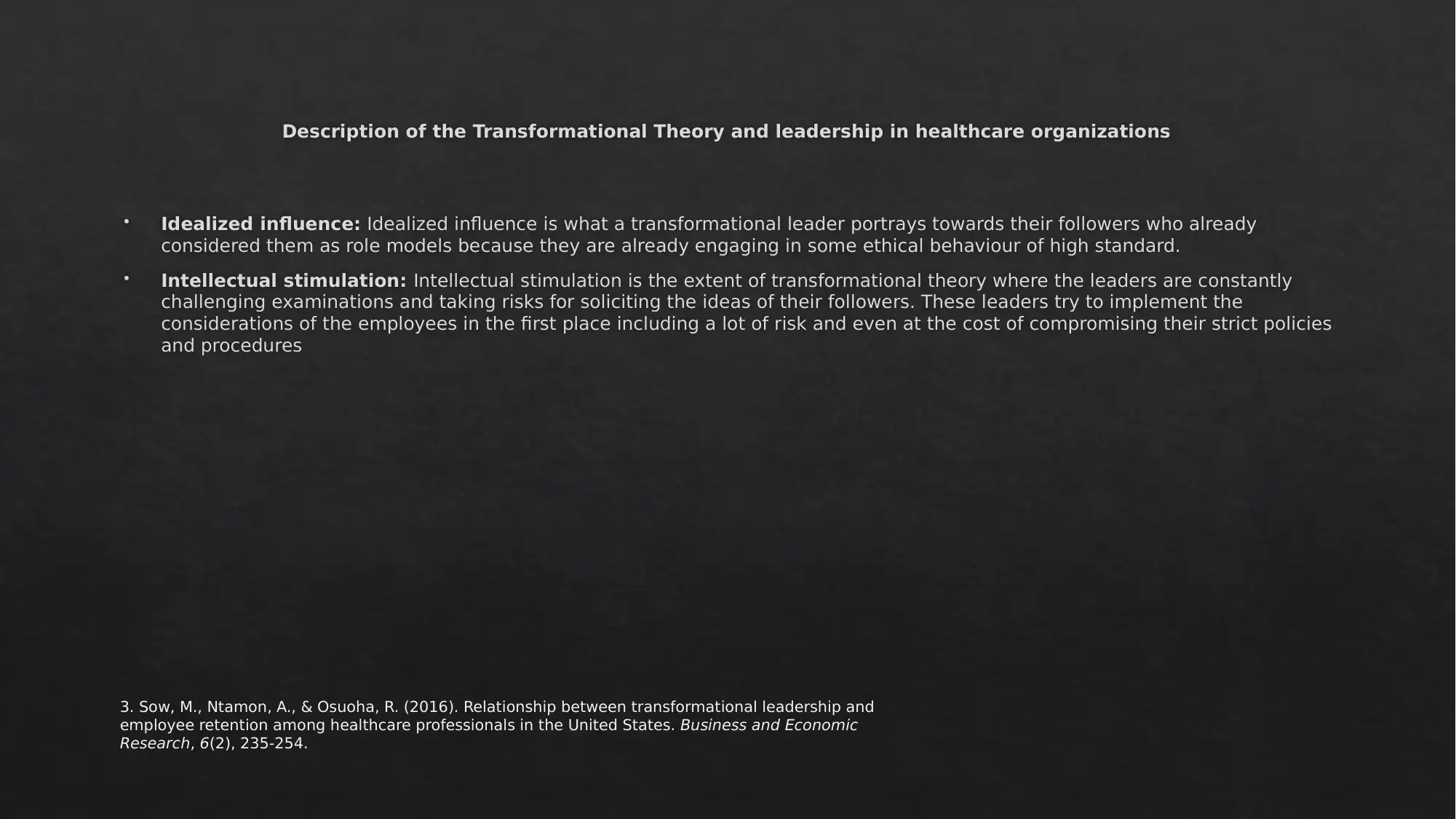
Description of the Transformational Theory and leadership in healthcare organizations
Idealized influence: Idealized influence is what a transformational leader portrays towards their followers who already
considered them as role models because they are already engaging in some ethical behaviour of high standard.
Intellectual stimulation: Intellectual stimulation is the extent of transformational theory where the leaders are constantly
challenging examinations and taking risks for soliciting the ideas of their followers. These leaders try to implement the
considerations of the employees in the first place including a lot of risk and even at the cost of compromising their strict policies
and procedures
3. Sow, M., Ntamon, A., & Osuoha, R. (2016). Relationship between transformational leadership and
employee retention among healthcare professionals in the United States. Business and Economic
Research, 6(2), 235-254.
Idealized influence: Idealized influence is what a transformational leader portrays towards their followers who already
considered them as role models because they are already engaging in some ethical behaviour of high standard.
Intellectual stimulation: Intellectual stimulation is the extent of transformational theory where the leaders are constantly
challenging examinations and taking risks for soliciting the ideas of their followers. These leaders try to implement the
considerations of the employees in the first place including a lot of risk and even at the cost of compromising their strict policies
and procedures
3. Sow, M., Ntamon, A., & Osuoha, R. (2016). Relationship between transformational leadership and
employee retention among healthcare professionals in the United States. Business and Economic
Research, 6(2), 235-254.
⊘ This is a preview!⊘
Do you want full access?
Subscribe today to unlock all pages.

Trusted by 1+ million students worldwide
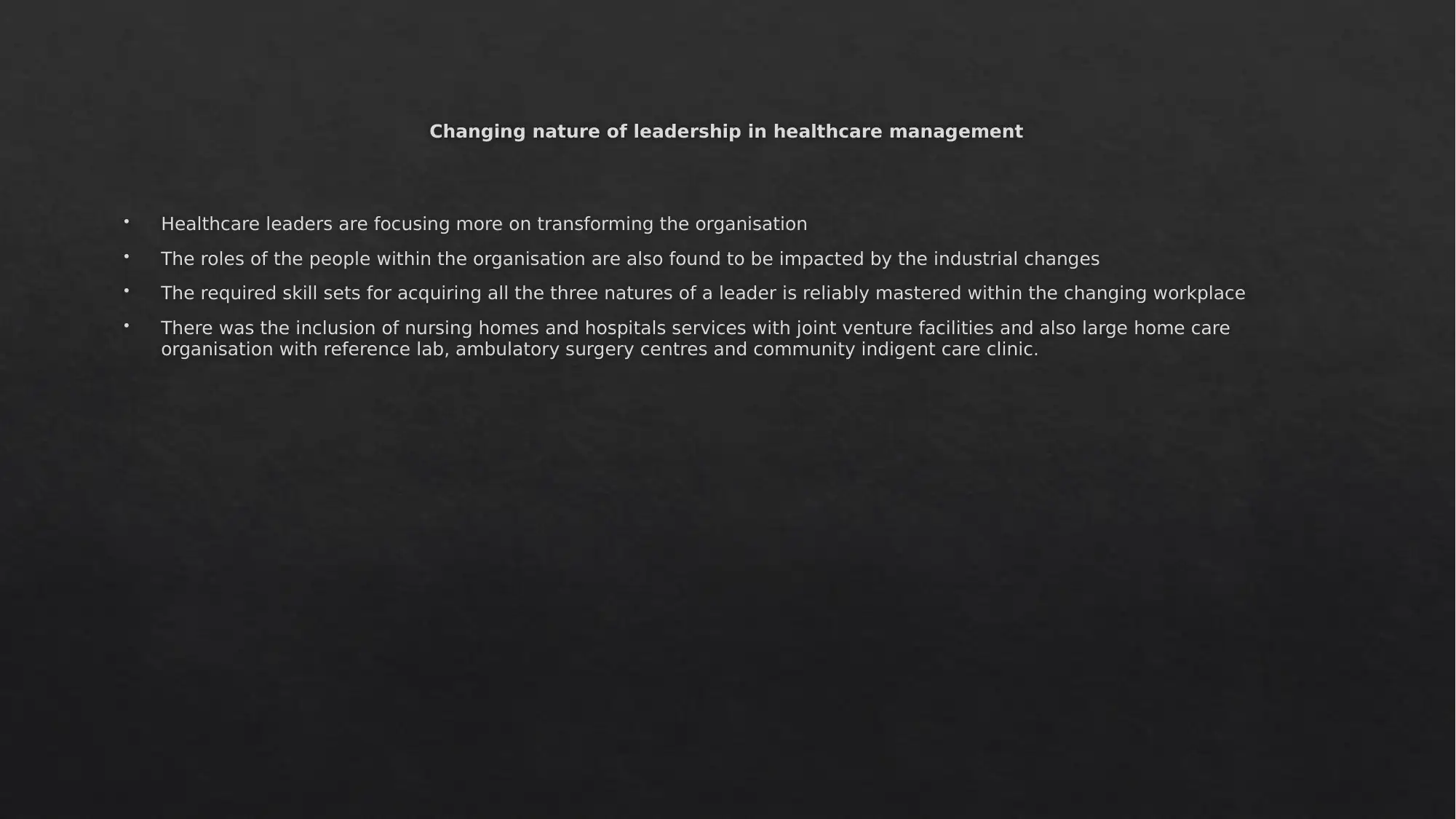
Changing nature of leadership in healthcare management
Healthcare leaders are focusing more on transforming the organisation
The roles of the people within the organisation are also found to be impacted by the industrial changes
The required skill sets for acquiring all the three natures of a leader is reliably mastered within the changing workplace
There was the inclusion of nursing homes and hospitals services with joint venture facilities and also large home care
organisation with reference lab, ambulatory surgery centres and community indigent care clinic.
Healthcare leaders are focusing more on transforming the organisation
The roles of the people within the organisation are also found to be impacted by the industrial changes
The required skill sets for acquiring all the three natures of a leader is reliably mastered within the changing workplace
There was the inclusion of nursing homes and hospitals services with joint venture facilities and also large home care
organisation with reference lab, ambulatory surgery centres and community indigent care clinic.
Paraphrase This Document
Need a fresh take? Get an instant paraphrase of this document with our AI Paraphraser
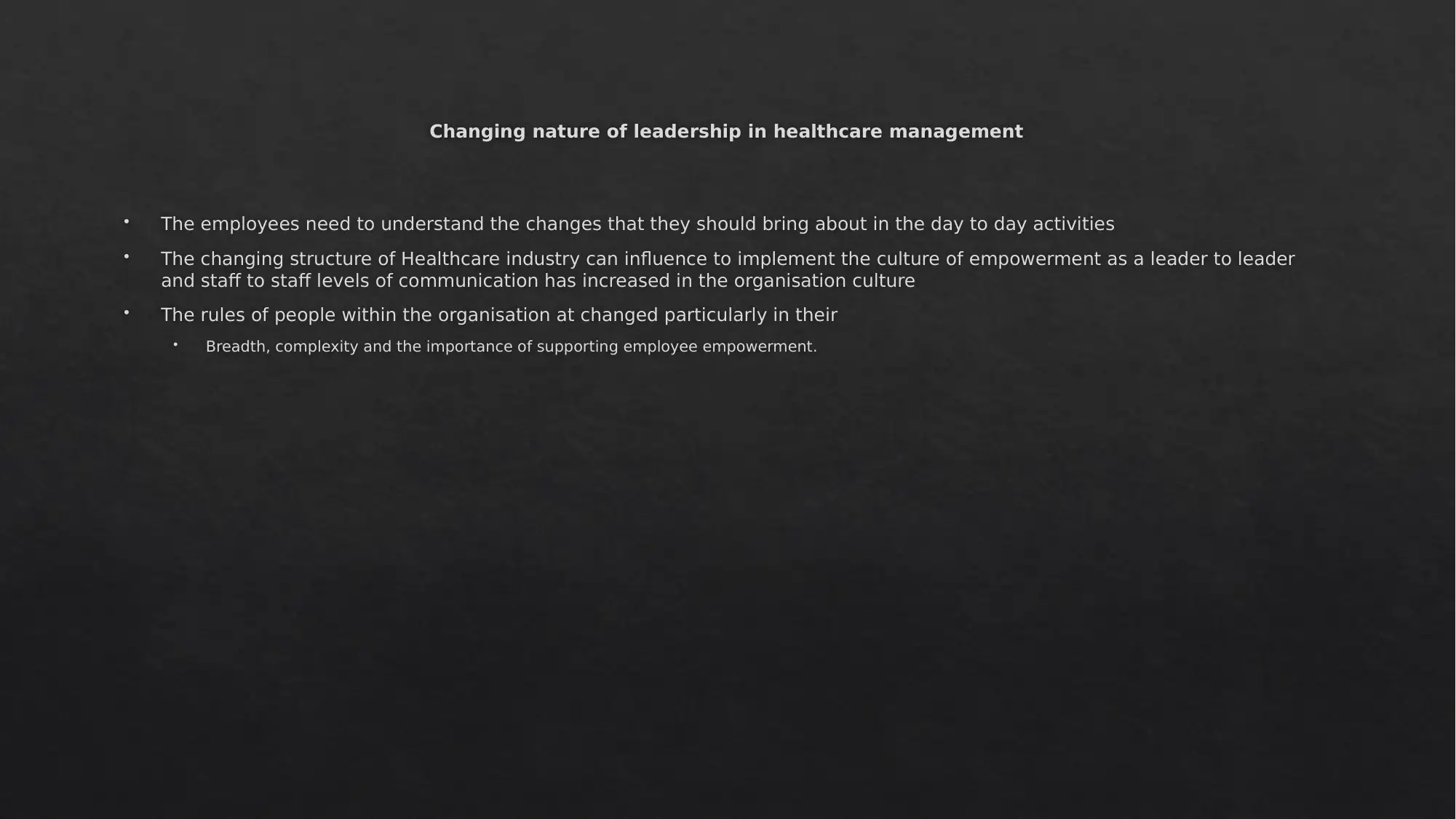
Changing nature of leadership in healthcare management
The employees need to understand the changes that they should bring about in the day to day activities
The changing structure of Healthcare industry can influence to implement the culture of empowerment as a leader to leader
and staff to staff levels of communication has increased in the organisation culture
The rules of people within the organisation at changed particularly in their
Breadth, complexity and the importance of supporting employee empowerment.
The employees need to understand the changes that they should bring about in the day to day activities
The changing structure of Healthcare industry can influence to implement the culture of empowerment as a leader to leader
and staff to staff levels of communication has increased in the organisation culture
The rules of people within the organisation at changed particularly in their
Breadth, complexity and the importance of supporting employee empowerment.

Impact of Transformational Theory in Leadership on Healthcare services
Transformational leadership style in Healthcare is a theoretical approach that is found to be used in these organizations for involving a vision towards doing
about cultural change and care delivery within an organization.
With the use of transformational theory to the leadership style it is found that the employees in the organizations are understanding the present reality in the
business market and also realizing the opportunities for improved Healthcare management5.
The employees are being led to implement cultural changes for a better working environment.
Healthcare industry is at a position that patient satisfaction and quality of care is highly regarded as the responsibility of a
leader within the organisation
People working at the Healthcare industry are always suffering from stress and burnouts
5. Krepia, V., Katsaragakis, S., Kaitelidou, D., & Prezerakos, P. (2018). Transformational leadership and
its evolution in nursing. Progress in Health Sciences, 8(1).
Transformational leadership style in Healthcare is a theoretical approach that is found to be used in these organizations for involving a vision towards doing
about cultural change and care delivery within an organization.
With the use of transformational theory to the leadership style it is found that the employees in the organizations are understanding the present reality in the
business market and also realizing the opportunities for improved Healthcare management5.
The employees are being led to implement cultural changes for a better working environment.
Healthcare industry is at a position that patient satisfaction and quality of care is highly regarded as the responsibility of a
leader within the organisation
People working at the Healthcare industry are always suffering from stress and burnouts
5. Krepia, V., Katsaragakis, S., Kaitelidou, D., & Prezerakos, P. (2018). Transformational leadership and
its evolution in nursing. Progress in Health Sciences, 8(1).
⊘ This is a preview!⊘
Do you want full access?
Subscribe today to unlock all pages.

Trusted by 1+ million students worldwide
1 out of 17
Related Documents
Your All-in-One AI-Powered Toolkit for Academic Success.
+13062052269
info@desklib.com
Available 24*7 on WhatsApp / Email
![[object Object]](/_next/static/media/star-bottom.7253800d.svg)
Unlock your academic potential
Copyright © 2020–2026 A2Z Services. All Rights Reserved. Developed and managed by ZUCOL.





